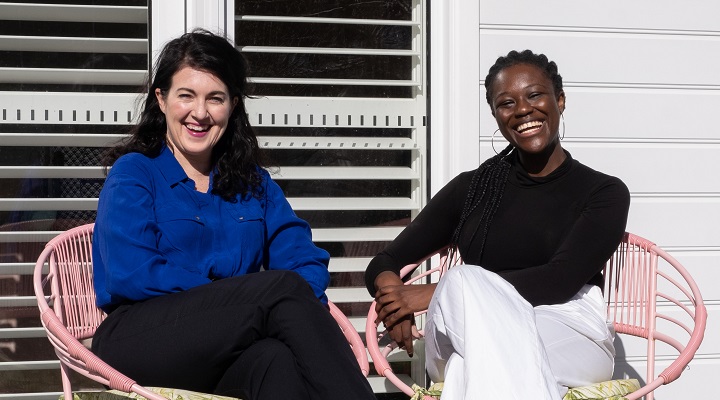Sarah Agboola is the founder of mtime and Rebecca Kraut is the enterprise’s COO. Together, Sarah and Rebecca are helping stressed, time-poor parents by matching them with a ‘moncierge’ – a family assistant who visits the home to support parents by cooking, cleaning and providing childcare. This flexible mix of in-home care creates the time and space for parents to prioritise what’s important – easing the mental and physical load of busy family life.
ISB: What was the inspiration behind the launch of mtime?
Sarah Agboola: When I was a teenager, my dad passed away very suddenly. I have two younger sisters and our closest relatives live in Nigeria. So, my mum was tasked with taking care of a household, three children, and full-time work by herself, when what she really needed was someone to take care of her while she recovered from her own grief.
This experience imprinted on me, and I realised that parents of all backgrounds are dealing with their own struggles but there wasn’t anything that truly addressed their needs. Just imagine, after a busy day at work, you come home not for a break, but to be an on-demand cleaner, nanny or chef. You could hire a cleaner but they won’t look after your kids, or you could hire a nanny but they won’t clean your home. And even if you hire them both, you still have laundry, dinner and errands to think about.
“Our goal is to create a seamless and holistic path to employment for anyone who wants to be a carer.”
So, mtime was created not only to help parents like my mum, who are in high-stress situations, but also to help people with the chronic stresses that come from modern life.
ISB: A lot of businesses today are leveraging the ‘gig economy’ but you directly employ your moncierges – what is the reasoning behind that approach?
SA: We actively chose not to run as a gig economy marketplace because we knew that one of the big reasons many in-home or childcare-based businesses of that nature fail is because of the lack of consistency for customers. The word ‘gig’ implies one-off commitments that you can opt in or out of, but we needed our moncierges to work at the same time, with the same family, every single week. This commitment to them around regular hours and stable pay is part of our ‘culture of care’, and we believe that if we take care of our moncierges, then they are better placed to take care of the families, who are then better able to take care of themselves.
ISB: And what are the chief benefits of that model to, firstly, your employees and, secondly, to the business itself?
SA: The biggest benefits for our staff are security and stability. Our moncierges rest assured that they will get paid every fortnight, receive super on top of their wage, are fully covered by insurance and if ever they have any issues at work the mtime team is there to support them. This security was most evident during COVID, as many of our team received JobKeeper and were able to support their families when we were forced to close. The stability of the role comes from our decision to run mtime as a subscription service rather than as an ‘on demand’ marketplace. Moncierges aren’t randomly messaged about one-off gigs, instead they get an offer for ongoing, stable work at hours that suit their schedule.
Rebecca Kraut: The collective outcome of this is that every single employee has a true sense of belonging to our community. We have moncierges who have become mentors and trainers to support our new recruits, and we even have a member of our recruitment team who started as a moncierge and has progressively been promoted into a head office role. This is why we see longer customer tenure than is standard for the care industry, which is a great win for revenue.
ISB: How has mtime been received since its launch?
RK: We launched in 2017, and in the five years since, the demand for our service has never been higher. We’ve had families begging us to skip the queue to be matched, and people across Australia have been contacting us saying, “Please, please, when are you bringing mtime to my city?”
Pre-pandemic, we had strong customer growth sourced from [search engine marketing] SEM and a small amount of content marketing. Demand was steady and in line with moncierge acquisition. Interestingly, during COVID, despite our inability to deliver the service, we had consistent spikes of customer enquiries. I believe the heightened stress of lockdown life only further increased the realisation for many families that they desperately needed extra support; they needed that spare set of hands more than ever. This reinforced the need to make the market aware that this type of service exists, so we doubled down on creating content while we had the space to do so.
By 2022, when we were able to operate as normal again, that content strategy was paying off. Despite not increasing our marketing spend, our customer numbers jumped to the point that for a period we switched to waitlist only. To this day, our biggest challenge is that we cannot source nearly enough moncierges to work with our families – we joke almost every day about what a great problem this is to have.
ISB: I understand you have eschewed off-the-shelf technology to develop your own platform – what drove that decision?
SA: Honestly, we’d have preferred to use something ‘off-the-shelf’, and we tried to, but the existing HR software we found was built for white-collar professionals, or focused only on recruiting but not staff management or onboarding, or didn’t account for large mobile workforces, or had limited integration for all the safety and compliance checks we require…Need I go on?
RK: Exactly. Even products built for NDIS support workers were missing key features we required for our service to run at its best. So, we decided to create a custom solution that covers the entire journey for people entering the care industry, as the current alternatives are fractured and do not take in the needs of jobseekers. Our goal is to create a seamless and holistic path to employment for anyone who wants to be a carer.
ISB: How do you see mtime growing and developing in the next couple of years?
SA: From the get go, my vision has been for mtime to become a global care network that enables anyone, anywhere to access the care they need, while ensuring that anyone anywhere can get a job in the care industry and support their community.
RK: We’re super excited about an imminent expansion across Australia, starting in regional Victoria, and then we’ll be opening in additional capital cities by the end of the year. After that, we plan to expand internationally.
SA: As someone who grew up in a regional town, I’m thrilled that we’re opening in those areas. We often get a bit overlooked so it’s an awesome opportunity to be going there. Ultimately I can’t wait for the day that when people think of care they think of mtime. To know that no matter where you are in the world, when you need care, mtime will be there.
This article first appeared in issue 38 of the Inside Small Business quarterly magazine












